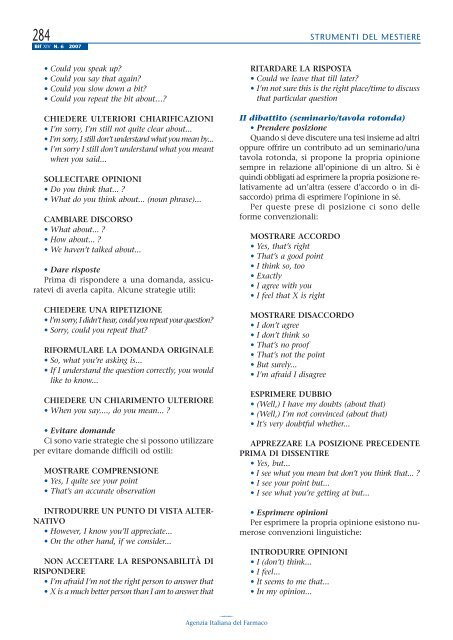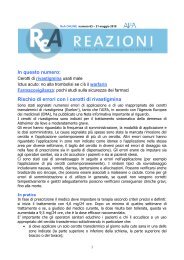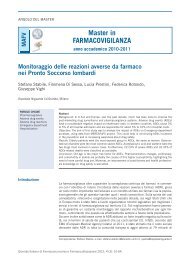Bollettino d'Informazione sui Farmaci n. 6/2007 - Sefap
Bollettino d'Informazione sui Farmaci n. 6/2007 - Sefap
Bollettino d'Informazione sui Farmaci n. 6/2007 - Sefap
You also want an ePaper? Increase the reach of your titles
YUMPU automatically turns print PDFs into web optimized ePapers that Google loves.
284<br />
Bif XIV N. 6 <strong>2007</strong><br />
• Could you speak up?<br />
• Could you say that again?<br />
• Could you slow down a bit?<br />
• Could you repeat the bit about…?<br />
CHIEDERE ULTERIORI CHIARIFICAZIONI<br />
• I’m sorry, I’m still not quite clear about...<br />
• I’m sorry, I still don’t understand what you mean by...<br />
• l’m sorry I still don’t understand what you meant<br />
when you said...<br />
SOLLECITARE OPINIONI<br />
• Do you think that... ?<br />
• What do you think about... (noun phrase)...<br />
CAMBIARE DISCORSO<br />
• What about... ?<br />
• How about... ?<br />
• We haven’t talked about...<br />
• Dare risposte<br />
Prima di rispondere a una domanda, assicuratevi<br />
di averla capita. Alcune strategie utili:<br />
CHIEDERE UNA RIPETIZIONE<br />
• l’m sorry, I didn’t hear, could you repeat your question?<br />
• Sorry, could you repeat that?<br />
RIFORMULARE LA DOMANDA ORIGINALE<br />
• So, what you’re asking is...<br />
• If I understand the question correctly, you would<br />
like to know...<br />
CHIEDERE UN CHIARIMENTO ULTERIORE<br />
• When you say...., do you mean... ?<br />
• Evitare domande<br />
Ci sono varie strategie che si possono utilizzare<br />
per evitare domande difficili od ostili:<br />
MOSTRARE COMPRENSIONE<br />
• Yes, I quite see your point<br />
• That’s an accurate observation<br />
INTRODURRE UN PUNTO DI VISTA ALTER-<br />
NATIVO<br />
• However, I know you’ll appreciate...<br />
• On the other hand, if we consider...<br />
NON ACCETTARE LA RESPONSABILITÀ DI<br />
RISPONDERE<br />
• I’m afraid I’m not the right person to answer that<br />
• X is a much better person than I am to answer that<br />
<br />
Agenzia Italiana del Farmaco<br />
RITARDARE LA RISPOSTA<br />
• Could we leave that till later?<br />
• I’m not sure this is the right place/time to discuss<br />
that particular question<br />
II dibattito (seminario/tavola rotonda)<br />
• Prendere posizione<br />
Quando si deve discutere una tesi insieme ad altri<br />
oppure offrire un contributo ad un seminario/una<br />
tavola rotonda, si propone la propria opinione<br />
sempre in relazione all’opinione di un altro. Si è<br />
quindi obbligati ad esprimere la propria posizione relativamente<br />
ad un’altra (essere d’accordo o in disaccordo)<br />
prima di esprimere l’opinione in sé.<br />
Per queste prese di posizione ci sono delle<br />
forme convenzionali:<br />
MOSTRARE ACCORDO<br />
• Yes, that’s right<br />
• That’s a good point<br />
• I think so, too<br />
• Exactly<br />
• I agree with you<br />
• I feel that X is right<br />
MOSTRARE DISACCORDO<br />
• I don’t agree<br />
• I don’t think so<br />
• That’s no proof<br />
• That’s not the point<br />
• But surely...<br />
• I’m afraid I disagree<br />
ESPRIMERE DUBBIO<br />
• (Well,) I have my doubts (about that)<br />
• (Well,) I’m not convinced (about that)<br />
• It’s very doubtful whether...<br />
APPREZZARE LA POSIZIONE PRECEDENTE<br />
PRIMA DI DISSENTIRE<br />
• Yes, but...<br />
• I see what you mean but don’t you think that... ?<br />
• I see your point but...<br />
• I see what you’re getting at but...<br />
• Esprimere opinioni<br />
Per esprimere la propria opinione esistono numerose<br />
convenzioni linguistiche:<br />
INTRODURRE OPINIONI<br />
• I (don’t) think...<br />
• I feel...<br />
• It seems to me that...<br />
• In my opinion...<br />
STRUMENTI DEL MESTIERE






